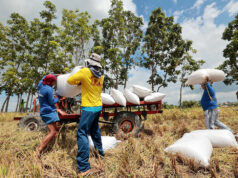Weather-based crop insurance bill filed in House
A LEGISLATOR has re-filed a bill which seeks to create a weather-based crop insurance scheme for farmers to protect them from climate change and weather disturbances.
Las Piñas Representative Camille A. Villar’s House Bill No. 3310 has been proposed as the Free Index-Based Agriculture Insurance (FIBAI) Act of 2019.
“Weather index-based crop insurance (WIBCI) is a unique insurance product based on the occurrence of breach of a weather-based parameter, which serves as legal proof of the occurrence of extremely adverse weather conditions and proxy for the expected crop damage,” Ms. Villar said in a statement Sunday.
Weather-based insurance uses an index like rainfall “to determine payouts and these can be made more quickly and with less argument than is typical for conventional crop insurance.”
She said that this type of insurance will improve the mandate and current coverage of the Philippine Crop Insurance, Corp. (PCIC). “So far, it has too few participants and very miniscule outreach compared with the total number of farmers that are supposed to be served.”
“It maximizes the use of relevant technologies and networks in order to reach out to more and more farmers; and provides faster payout turn-around in the event of breach of the agreed parameters without need for bureaucratic processing by an adjuster. The hassle-free disbursement of claims is made possible through the use of technology and a widely distributed network of payment centers,” Ms. Villar said.
Ms. Villar said Congress has been appropriating an average of P1.55 billion each year to subsidize the PCIC insurance premiums on 600,000 hectares of rice farms in some provinces from 2013 to 2017.
“Still, against a total of almost P380 billion in palay production in 2014, the PCIC has been insuring only around P12.2 billion worth of crops annually or roughly 3% of potential insurable value,” she said, noting that some small farmers remain uninsured.
Another provision in the bill is the support for re-insurance to provide a second layer of insurance support to help the originating insurance providers absorb shocks from disasters.
This enables originating insurance providers to tap predictable financial relief and gives them greater capacity to insure more and more farmer clients and strengthen social resilience.
Ms. Villar said the bill will require P5.8 billion per year to be initially sourced from the Risk Management Fund.
A similar bill was also filed in the 17th Congress by Rep. Arthur Yap. It was approved on final reading by the House of Representatives but was not passed by the Senate. — Vince Angelo C. Ferreras



